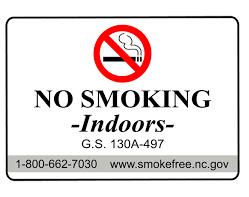Food Service Establishments
Temporary Food Service Establishments | Mobile Food Units and Push Carts | Limited Food Service Establishments | ServSafe | Associated Fees
*****NEW 2017 Food Code for Food Service Establishments*****
Effective October 1st, 2021 North Carolina has adopted and implemented the new 2017 Food Code as our food protection rules. This will replace the use of the 2009 Food Code that was previously used. The new 2017 Food Code Manual, a summary of changes and new required policies and plans can be found in the links below:
- 2017 Food Code Manual
- 2017 NC Food Code Adoption Summary of Changes Document (Spanish) (Chinese)
- Employee Health Policy-Food Employee Reporting Agreement (Spanish) (Chinese)
- Vomit and Diarrhea Clean-Up Plan (Spanish) (Chinese)
- Vomit and Diarrhea Clean-Up Poster
- Allergen Management Poster
- Demonstration of Knowledge (17 Questions) (Spanish) (Chinese)
Ensuring proper sanitation in food service establishments is important to public health and the prevention of food-borne illness. The Food and Lodging section enforces the state rules in the permitting and inspections of food handling establishments. The frequency of inspections varies for each establishment depending on the risk factors and how food is processed in the facility. Establishments can be inspected one to four times a year depending on this risk-based inspection category.
There are five major risk factors in prevention of a food-borne illness:
- Poor personal hygiene
- Inadequate cooking
- Improper food temperatures
- Cross contamination
- Food from unapproved sources
The types of food service facilities inspected by this department include:
- Restaurants
- Food stands
- Delis and meat markets
- Public and private school cafeterias
- Mobile food units and push carts
- Elderly nutrition sites and institutional kitchens
- Limited food service establishments
- Temporary food service establishments
Constructing or Buying a Restaurant
All food service establishments must have a valid permit from this office in order to operate. Prior to the construction of a new establishment, plans must be submitted and approved by the Environmental Health Office and other regulatory agencies, such as Building Inspections. An existing permit is not transferable from one owner to another. When an establishment changes ownership, our office must be contacted to conduct an evaluation of the establishment prior to opening in order for a transitional permit to be issued to the new owner. The transitional permit allows the new operator 180 days to repair all non-compliant items found during the initial evaluation.
Plan Review Application for New Construction of a Food Service Establishment
Transitional Permit Application (existing Food Service Establishment with a change of ownership)
Limited Food Service Establishments
Limited Food Service Establishments are those that prepare or serve food in conjunction with amateur athletic events or lodging establishments that only serve precooked items for the breakfast meal.
Download the Application for a Limited Food Service Establishment.
Festivals, Fairs, Carnivals, and Events
All food vendors wishing to sell potentially hazardous foods at an event in Johnston County must complete an application and return it to our office with the required fee at a minimum of 15 days prior to the date of operation. The event sponsor must also notify the department prior to the event and complete all necessary forms from this office. Forms must be submitted to this office at least 15 days prior to the event date.
Not all food vendors need a permit. Vendors who sell foods that are not considered potentially hazardous may not require a permit from this office in order to operate. Foods that do not require a permit include:
- Popcorn or kettle corn
- Candy
- Pies, cakes, and cookies
- Desserts or fried desserts
- Ice cream
- Snowballs
- Funnel cakes or elephant ears
- Candy apples
- Ice and beverages such as coffee, teas, and lemonade
- Whole raw fruits and vegetables
The above-listed foods may be regulated by the North Carolina Department of Agriculture. The NC Department of Agriculture can be contacted directly at (919) 733-7366.
View a list of the foods that require a permit versus those that do not.
Sponsor Form for a Temporary Food Service Establishment
Application and requirements for a Temporary Food Establishment Permit
Non-Profit Organizations
Organizations that are "bona-fide" not-for-profit can claim a two-day exemption from having to receive a permit. The two-day exemption can only be used once per month for two consecutive days. Non-profit vendors must submit documentation to this office showing their non-profit status.
Documentation of Exemption form (for non-profits)
General Guidelines for Mobile Food Units
A mobile food unit is a fully enclosed food service establishment that is vehicle-mounted and readily moved, simply stated as a restaurant on wheels. A pushcart is a small, unenclosed mobile piece of equipment that is designed to serve hot dogs only. Both types of units are required to be permitted through this office and shall operate in conjunction with a permitted restaurant or commissary. The owner or operator of the restaurant or commissary must complete the required Agreement form from this office.
All requirements for push carts and mobile food units are found in the Rules Governing the Sanitation of Food Service Establishments, sections .2638 to .2640.
All units are required to have a potable water system with hot and cold running water under pressure. Units must have a sewage storage tank that is 15 percent larger than the water supply tank. At least a single-compartment sink with integral drain boards on each side of the sink shall be provided for utensil washing, a separate lavatory is also required for hand washing. Depending on the type or volume of foods prepared on the unit, a sink for vegetable or meat preparation may also be required. Units must have mechanical refrigeration capable of keeping all potentially hazardous foods at 45 degrees F or below. All equipment such as sinks, refrigeration, cooking, and hot-holding equipment shall meet the NSF/ANSI sanitation standard.
Mobile Food Unit Application and Commissary Agreement
Mobile Food Unit Daily Operation Log Sheet
The email address to notify us of your Mobile Food Units Operation: mfuinspection@johnstonnc.com
General Guidelines for Push Carts
A push cart must be constructed to meet the provisions of 15A NCAC 18A .2600 and NSF/ANSI standard 59. If the push cart is not NSF, the manufacturer or owner must submit documentation that demonstrates it is constructed to meet the equivalency of the NSF/ANSI standard. These forms can be found in the links below. Only hot dogs and similar types of products can be prepared, handled, or served from a push cart. All foods and utensils on the cart must be protected by an enclosure at all times to protect them from contamination. View the links below for the design guidelines and applications for push carts.
Push Cart Design Instruction Memo
Design and Construction Requirements for Push Carts (with Verification form)
Push Cart Application and Commissary Agreement Form
Pushcart Daily Operating Log Sheet
The email address to notify us of your Push Carts Operation: mfuinspection@johnstonnc.com
Important Links
General Food Service Links
- View the current sanitation inspection reports
- List of Foods that Require a Permit
- Food Handling Recommendations
- Employee Health Policy
- NC Food Code Manual
- Time as a Public Health Control Form
- Par-Cooking Agreement Form
- Commissary Agreement Form for Pushcarts and Mobile Food Units
Food Service Facilities
- Plan Review Application for New Construction of a Food Service Establishment
- Rules Governing the Sanitation of Food Service Establishments
Limited Food Service Establishments
Temporary Food Establishments
- Sponsor Form (for Carnivals, Fairs, Festivals, etc.)
- Application for a Temporary Food Service Permit
- Documentation of Exemption form (for non-profits)
Mobile Food Units and Push Carts
Page last updated: November 14, 2024
Contact Us

Todd Ramsey
Director
309 E. Market Street
Smithfield, NC 27577
Phone: (919) 989-5180
Fax: (919) 989-5190
To find a copy of your septic permit,
send request to
envhealth@johnstonnc.com
Hours of Operation
Monday - Friday, 8:00 a.m. - 5:00 p.m.
(except holidays)
View Complete Employee Directory











